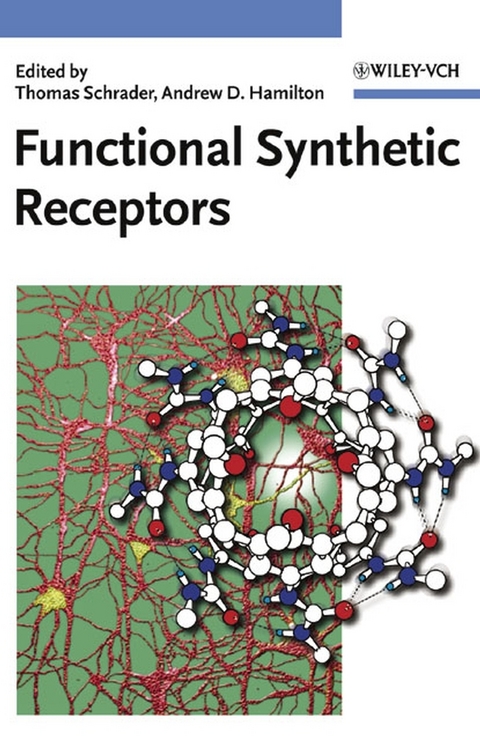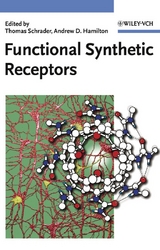Functional Synthetic Receptors
Wiley-VCH (Verlag)
978-3-527-30655-8 (ISBN)
- Titel gebraucht verfügbar
- Artikel merken
A timely overview of this rapidly-expanding topic, covering the most important classes of compounds and incorporating the latest literature. With its application-oriented approach, this book is the first to emphasize current and potential applications, extending to such fields as materials science, bioorganic chemistry, medicinal chemistry, and organic synthesis. In the biological context in particular, the book clarifies which receptor systems work well in water or better under physiological conditions.From the contents:* Amino Acid, Peptid and Protein Receptors* Carbohydrate Receptors* Ammonium, Amidinium and Guanidinium Receptors* Anion Receptors* Molecular Capsules and Self Assembly* Dynamic Combinatorial Libraries based on Molecular Recognition* Molecular Machines* Self-ReplicationAimed at graduate students and specialists in the field, this is also of interest to pharmaceutical companies involved in drug design, as well as chemical companies with a polymer or nanotechnology group. In addition, analytical companies working on the advanced equipment covered here will find stimulating new applications.
Thomas Schrader is Professor of Organic Chemistry at the University of Marburg. He studied chemistry and obtained his PhD in 1988 under W. Steglich at the Friedrich-Wilhelms-University of Bonn. After a postdoctorate stay at Princeton University under E.C. Taylor on total synthesis of antitumor agents, he gained his lecturing qualification at the University of Düsseldorf. In 2000 he joined the University of Marburg as associate professor. His research focuses on bioorganic aspects of supramolecular systems, optimizing and multiplying new binding motifs for characteristic structural features in biomolecules - a concept that leads to artificial receptor molecules capable of specifically interfering with biological processes. Applications include biosensors, drugs countering protein misfolding and tweezers for protein assembly. Professor Schrader is the holder of the Bredereck-symposium prize in bioorganic chemistry (2001). Andrew D. Hamilton received his PhD from Cambridge University in 1980, and the following year carried out his postdoc research at Université Louis Pasteur, Strasbourg. Between 1981 and 1988 he was Assistant Professor for Chemistry at Princeton University, thereafter Associate Professor until 1992, when he became Full Professor at the University of Pittsburgh, a post he held until 1997. Since 1997 he has been Irénée duPont Professor of Chemistry and, since 1998, Professor of Molecular Biophysics and Biochemistry at Yale University. Here he held the Chair of the Chemistry Department between 1999 and 2003, and has been Deputy Provost for Science and Technology since 2003. Professor Hamilton lectures at several universities in the USA.
Artificial (Pseudo)peptides for Molecular Recognition and Catalysis
Carbohydrate Receptors
Ammonium, Amidinium, Guanidinium, and Pyridinium Cations
Artificial Pyrrole-based Anion Receptors
Molecular Containers in Action
Formation and Recognition Properties of Dynamic Combinatorial Libraries
Synthetic Molecular Machines
Towards Self-replicating Nanorobots - A Chemical Perspective
| Erscheint lt. Verlag | 14.2.2005 |
|---|---|
| Sprache | englisch |
| Maße | 170 x 240 mm |
| Gewicht | 960 g |
| Themenwelt | Naturwissenschaften ► Chemie ► Organische Chemie |
| Schlagworte | Biochemie • Biochemie u. Chemische Biologie • Biochemistry (Chemical Biology) • Biowissenschaften • Cell & Molecular Biology • Cell & Molecular Biology • Chemie • Chemistry • Life Sciences • Molekularbiologie • Organic Chemistry • Organische Chemie • Pharmaceutical & Medicinal Chemistry • Pharmaceutical & Medicinal Chemistry • Pharmazeutische Chemie • Pharmazeutische u. Medizinische Chemie • Rezeptoren • Zell- u. Molekularbiologie |
| ISBN-10 | 3-527-30655-2 / 3527306552 |
| ISBN-13 | 978-3-527-30655-8 / 9783527306558 |
| Zustand | Neuware |
| Informationen gemäß Produktsicherheitsverordnung (GPSR) | |
| Haben Sie eine Frage zum Produkt? |
aus dem Bereich





